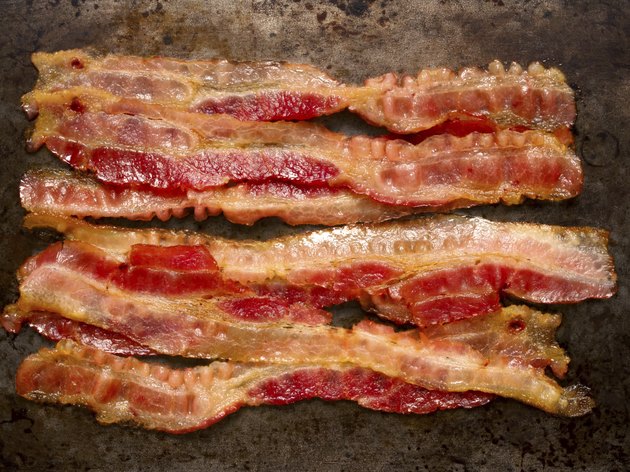
You may have noticed that a high-fat meal lingers longer in your stomach than a low-fat meal. The length of time until fat is absorbed from food depends on the nutrient makeup of the meal and may vary significantly from one person to another. The higher the fat content of a meal, the longer it takes to reach complete digestion and absorption. If you are healthy and do not have digestive problems, complete absorption of dietary fat from an average meal typically occurs in roughly eight hours.
Stomach Emptying
脂肪可以分解和吸收之前,佛od you eat must undergo processing in your stomach and pass into your small intestine. Many factors of a meal affect the rate of stomach emptying, including the consistency of the food, the volume of food you consume, and the relative percentages of protein, carbohydrates and fats in the meal. Hormonal, nervous system and physical factors also affect the rate of stomach, or gastric, emptying. Fats empty from your stomach more slowly than carbohydrates and proteins. Your stomach typically empties a solid meal containing a mixture of fats, proteins and carbohydrates in roughly four to five hours.
Digestion
作为加工食品进入你的小肠,它将其与胰腺的消化酶混合在胆囊中。胆汁从饮食中加入脂肪,这使得它们通过胰酶脂肪酶进行崩溃。细胞衬里小肠的中间和远端部分吸收消化的脂肪,将它们转移到血液中。
Timing of Fat Absorption
Fat is an energy-rich nutrient that your digestive system works to capture as completely as possible. When you eat a meal with a small amount of fat, digestion and absorption occur relatively quickly once the food arrives in your small intestine. Your gastrointestinal system requires more time to break down a high-fat meal. Although there is great variability, fat from a typical meal goes through the digestive and absorptive processes within roughly three hours of entering your small intestine. The undigested remnants of a meal continue on to your large intestine, or colon, where they will eventually pass from your body as stool.
Conditions That Delay Fat Absorption
Several medical conditions and diseases slow fat digestion and absorption. Nerve damage due to diabetes or a neurological disease can significantly slow gastric emptying and the movement of food through your intestines. Anxiety can also slow food digestion and absorption. Mechanical obstruction caused by ulcers in your small intestine can also interfere with the passage of food from your stomach, delaying fat digestion and absorption.
- ICU Web; Gastric Emptying; Claudia Cheng, M.D.; August 2006
- Colorado State University Pathophysiology Hypertext; Gastrointestinal Transit: How Long Does It Take?; Richard Bowen, D.V.M., Ph.D.; May 2006
- Colorado State University Pathophysiology Hypertext; Exocrine Secretions of the Pancreas; Richard Bowen, D.V.M., Ph.D.; July 2006
- Colorado State University Pathophysiology Hypertext; Absorption of Lipids; Richard Bowen, D.V.M., Ph.D.; August 2007
- MayoClinic.com; How Long Does It Take to Digest Food — From the Time You Eat It to the Time You Excrete It in Urine or Stool?; Michael Picco, M.D.; August 2010